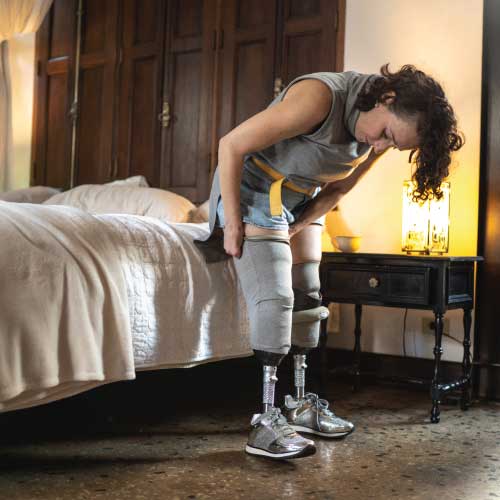A Peek Into the Future of Amputee Health Care
A digital transformation is key to improving health care for amputees by bridging the gap between revolutionary technology, patient psychology, and knowledge. But for that transformation to occur, a constant exchange of ideas is a must. In the UK, Swansea University’s Department of Mechanical Engineering took charge of the first of many discussions at the university.

The event, which took place a few months ago, brought together a range of healthcare professionals, industry experts, and academics from diverse backgrounds, including bio-mechanists, computer modelers, design engineering, machine learning, and psychology. The goal of the event was to discuss and better understand the concerns of prosthetic foot users and their clinicians.
Various experts presented new findings and technology, giving the attendees a peek into the future of amputee health care. One of the presentations was given by Rainer Schultheis, managing director of Saphenus Medical Technology. He demonstrated how technology could make the brain feel there are toes at the end of the prosthetic foot. Feeling that a prosthetic limb is part of the foot is vital for better prosthetic outcomes. It can also help relieve symptoms of phantom limb pain.
This presentation was notable because it was the first that demonstrated the possibilities of this technology not only in Wales but also in the UK.
On gait
Balancing prosthetic users’ gait, which, when left unchecked, can lead to a whole host of problems like back pain, is another area that needs a boost from technology. One of the presentations was given by Professor Rick Neptune, a specialist in neuromuscular biomechanics modeling from the University of Texas, Austin. He demonstrated how computer modeling and experimental data on human gait could help improve amputees’ gaits.
Dr. Nick Owen provided a tour of his gait lab facility in the Sports Science Department to demonstrate the University’s commitment to prosthetic science. Meanwhile, Dr. Ben Morgan presented an innovative calibration prosthetic foot, which he designed as part of his EngD research.
Dr. Rajesh Ransing, associate professor of mechanical engineering and the event’s organizer, gave a presentation on behalf of students Dr. Megan Morris and Dr. Turki Al Qalmas. Dr. Morris’ work was based on nature-inspired ideas on fortified lattice design structures that can be 3D printed. Meanwhile, Dr. Al Qalmas’ work focused on optimizing stiffness parameters using kinematic and numerical simulation models and categorizing unhealthy loads from gait data.
Mechanical engineering Ph.D. student Philip Pe demonstrated how computer vision algorithms could identify gait markers on a human body using webcams and smartphone cameras. He hopes this tool, combined with his research on deep-learning and artificial intelligence (AI), can help improve the experience of amputees and their clinicians.
Patient psychology
Psychology is also a vital part of amputee health care, and some presentations were geared toward helping clinicians improve patients’ mental states.
A presentation by Bournemouth University’s Professor Philip Sewell and Swansea University’s Professor Phil Reed delved into how patient psychology plays a crucial role in assessing the successful outcomes of assistive technology.
According to the presenters, people’s needs change over time, and amputees are the same. They adapt to their environment and react to expectations, which impact their psychological state. Furthermore, their psychological condition affects their subjective assessment of assistive technology, which already comes with psychological barriers. Therefore, it’s crucial to care for patients’ psychological states to help improve their prosthetic outcomes.
After the event, Dr. Ransing hopes everyone builds on the event’s success, discussing and executing ideas to improve amputees’ health care further.










































































